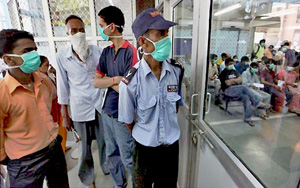New Delhi, Feb 16: The death toll from swine flu this year has soared to 585 with 100 more casualties reported across the country in three days since Feb. 12, prompting the Centre to order additional stocks of medicines and diagnostic kits.
While the total number of swine flu deaths had stood at 485 till February 12, the latest official data released today says 100 more people succumbed to the H1N1 virus in the three days till Feb. 15, taking the toll to 585. Altogether, 8,423 people have contracted swine flu this year in the country.
Rajasthan, Gujarat, Madhya Pradesh and Maharashtra are the worst-affected states with their respective tolls standing at 165, 144, 76 and 58, official figures said.
On Feb. 15 alone, Rajasthan reported 12 deaths while there were eight fresh casualties each in Madhya Pradesh and Gujarat.
While Delhi and Tamil Nadu have reported a high incidence of swine flu cases, the death toll in the two states is relatively low due to high level of awareness and a better developed health sector.
Punjab has the highest ratio of the number of deaths to those affected by the disease. Thus, 25 of the 68 people who contracted the virus in the state this year have succumbed to swine flu.
Health ministry officials said they have sent central teams to the worst-affected states like Rajasthan and Gujarat and have developed appropriate guidelines.
"The government has already placed an order for enhancing stocks of diagnostic kits -- for testing for the H1N1 virus -- to be supplied to the lab network under Integrated Disease Surveillance Programme.
"To enhance the level of preparedness, additional stocks of the drug, Oseltamivir, and 10,000 N-95 masks are also being procured," an official statement said.





Comments
Add new comment